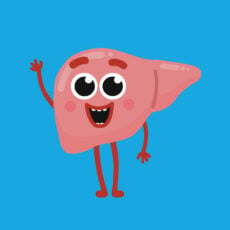What is Hepatitis B?
The hepatitis B virus is one of several viruses that can cause inflammation of the liver.
Hepatitis B is spread through the blood or sexual fluids (vaginal fluids or semen) of an infected person entering the blood stream of a non-infected person. It is also transmitted from mother to baby during birth.
Most people (95%) who get infected with hepatitis B as an adult will have a short term (acute) illness, and their body will get rid of the virus naturally. Symptoms of acute hepatitis B infection may be flu-like symptoms, muscle aches and pain, nausea, vomiting, fatigue and jaundice (yellow skin and eyes). However, many people will have no symptoms or have vague symptoms such as fatigue and not know that they have the infection. As of 2018, around 31.9%of people in Australia with chronic hepatitis B have not been diagnosed.
Untreated, chronic hepatitis B can lead to serious liver disease and/or liver cancer in one in four people (25%).
In Australia, hepatitis B in adults is spread most commonly through unprotected sex and unsterile injecting of illicit drugs. Vaccination is available for hepatitis B.
Hepatitis B is more of a problem if it is transmitted to a baby from their mother at birth, or during early childhood. If this happens, the baby or young child, has a 70-90% chance of going on to have chronic (long term) infection with hepatitis B. In Australia, more than 220,000 people have chronic hepatitis B.
Most of these chronic infections occurring in people who come from countries with a high incidence of hepatitis B (eg. South East Asia, Sub-Saharan Africa, Pacific Islands). Aboriginal and Torres Strait Islanders are also at increased risk of having chronic hepatitis B.
There are effective treatments for chronic hepatitis B that dramatically reduce the risk of serious liver disease such as liver cancer and cirrhosis. Untreated, chronic hepatitis B can lead to serious liver disease and/or liver cancer in 1 in 4 people, ie. 25% of people.
Treatment is accessed through either gastroenterology specialists or infectious diseases specialists at the outpatient departments of most major hospitals. You need a GP referral to be seen by a specialist for your hepatitis B.
Common Myths
Common myths and misconceptions related to hepatitis B.
Symptoms
Each person will experience hepatitis B differently, having some, many, or no symptoms at all. Symptoms vary and their severity and intensity may rise and fall over time.
It is therefore important to have an ongoing relationship with a qualified health practitioner who is knowledgeable about hepatitis B.
Transmission
Hepatitis B is a blood-borne and sexually transmitted infection which means it can be transmitted by blood to blood and sexual fluid contact.
Hepatitis B can also transmit from mother to child during childbirth.
Prevention & Vaccination
Hepatitis B is a vaccine-preventable disease.
Testing
Hepatitis B is diagnosed after a blood test is conducted. The blood test results for hepatitis B can be very complex and need to be interpreted by a health care professional.
If you think you may have been exposed at any time you should get tested.
Treatment
Treatment for chronic hepatitis B is used to control viral multiplication and/or slow down the process as much as possible.
Health Professionals
General practitioners are able to treat hepatitis B in consultation with specialists.
There is a range of information that can assist you in providing advice and support to clients who are concerned about, or may have been diagnosed with hepatitis B.
Support
Hepatitis B Community is a global peer-led, volunteer-driven forum to support to those living with and affected by hep B.
Visa & Migration information
This page provides a general guide for individuals living with hepatitis B, people who know someone with or affected by hepatitis B, and those seeking visa resources relating to hepatitis B.
The information is correct at the time of publication (August 2024) but may be subject to change. For tailored advice, consult a registered migration agent, lawyer, or healthcare provider.
Hepatitis B FAQs
Is there a vaccination for hepatitis B? Does it really work?
There is a vaccination for hepatitis B. It has been available since the early 1980s and has been part of the vaccination schedule in Australia since 2000. Babies, 10-13 year olds and some other groups – such as people with hepatitis C, people with HIV, people living in the same house as someone with hepatitis B, and people who inject drugs – can access the vaccination for free.
For full immunity, you MUST have all three injections over a six month period. For a very small number of people the vaccination doesn’t work and they don’t become immune. In these instances the individual can try a second course of vaccination, or try another formula. A very few people will never respond to vaccination which means they must take other prevention precautions.
My partner/housemate has hep B. Can I get it?
Hepatitis B can only be transmitted by the blood or sexual fluids of an infected person entering the bloodstream of a non-infected person.
It cannot be transmitted by sharing food, toilet seats, mosquitoes, hugging, kissing, holding hands, or simply by being together in the same room.. All partners and household members of people living with hepatitis B are recommended for hepatitis B vaccination.
A recent test shows that I have low immunity to hep B. Do I need a booster?
If you have completed your course of vaccinations, then hepatitis B booster shots are generally not recommended even when antibody levels are low (or declined) as there is good evidence that that vaccination provides long-term protection.
Booster doses are however recommended for people who are immune-compromised e.g. with HIV or renal failure (reference B Positive: A guide for primary care providers). At the same time, it may be that you haven’t completed the whole course of vaccinations. You should talk to your GP, who may recommend you get a booster.
I can’t remember if I’ve had one or two vaccinations. Am I fully covered?
You should talk to your GP to check that you have had the full course of vaccinations and that the vaccination has worked for you.










